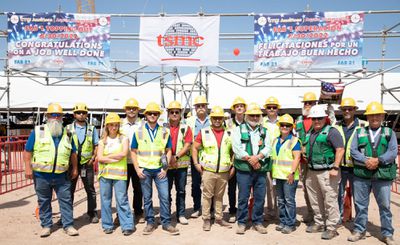Apple Chip Supplier TSMC Plans to Build Second $12 Billion Arizona Factory
Apple chip supplier TSMC plans to build another fabrication plant in Arizona alongside the $12 billion factory it has already committed to in Phoenix, reports The Wall Street Journal.

The second plant will be located north of Phoenix and investment is expected to be roughly similar to the $12 billion the company committed to in 2020, according to people familiar with the plans who spoke to
WSJ.
The original plant was originally expected to exclusively mass-produce 5nm chips, but it is now gearing up to also produce more advanced 4nm chips with larger capacity at the facility, according to WSJ's sources. The plant is expected to start mass production in 2024.
Meanwhile, the second plant is expected to manufacture cutting edge next-generation 3nm chips, a process that Apple is rumored to be moving its custom silicon to starting with the M2 Pro or M3 chip. Both Apple's M3 chip for Macs and A17 chip for iPhone 15 Pro models are expected to be manufactured based on TSMC's enhanced 3nm process. Bloomberg's Mark Gurman has said he expects the M2 Pro to be used in the 14-inch MacBook Pro, 16-inch MacBook Pro, and a high-end Mac mini.
The news about TSMC's unannounced plans follows attempts by the Biden administration to attract investments in U.S. chipmaking by offering companies billions in financial support to become established in the country. The efforts aim to counter China's tech sector ambitions and secure components considered vital to national security. The efforts were accelerated after the chip shortages in late 2020 and 2021 underlined how important semiconductors have become in the world of consumer electronics.
TSMC's main factories are located in Taiwan, but it already operates a factory in Camas, Washington, as well as design centers in Austin, Texas and San Jose, California, meaning that the second Arizona facility will be its third manufacturing site in the United States.
Popular Stories
Since the iPhone X in 2017, all of Apple's highest-end iPhone models have featured either stainless steel or titanium frames, but it has now been rumored that this design decision will be coming to an end with the iPhone 17 Pro models later this year.
In a post on Chinese social media platform Weibo today, the account Instant Digital said that the iPhone 17 Pro models will have an aluminum...
Apple is continuing to refine and update iOS 26, and beta three features smaller changes than we saw in beta 2, plus further tweaks to the Liquid Glass design. Apple is gearing up for the next phase of beta testing, and the company has promised that a public beta is set to come out in July.
Transparency
In some apps like Apple Music, Podcasts, and the App Store, Apple has toned down the...
The calendar has turned to July, meaning that 2025 is now more than half over. And while the summer months are often quiet for Apple, the company still has more than a dozen products coming later this year, according to rumors.
Below, we have outlined at least 15 new Apple products that are expected to launch later this year, along with key rumored features for each.
iPhone 17 Series
iPho...
Apple should unveil the iPhone 17 series in September, and there might be one bigger difference between the Pro and Pro Max models this year.
As always, the Pro Max model will be larger than the Pro model:iPhone 17 Pro: 6.3-inch display
iPhone 17 Pro Max: 6.9-inch displayGiven the Pro Max is physically larger than the Pro, it has more internal space, allowing for a larger battery and...
In 2020, Apple added a digital car key feature to its Wallet app, allowing users to lock, unlock, and start a compatible vehicle with an iPhone or Apple Watch. The feature is currently offered by select automakers, including Audi, BMW, Hyundai, Kia, Genesis, Mercedes-Benz, Volvo, and a handful of others, and it is set to expand further.
Apple has a web page with a list of vehicle models that ...
New renders today provide the best look yet relocated Apple logo and redesigned MagSafe magnet array of the iPhone 17 Pro and iPhone 17 Pro Max.
Image via Majin Bu.
Several of the design changes coming to the iPhone 17 Pro model have been rumored for some time, such as the elongated camera bump that spans the full width of the device, with the LiDAR Scanner and flash moving to the right side.
...
Apple's next-generation iPhone 17 Pro and iPhone 17 Pro Max are just over two months away, and there are plenty of rumors about the devices.
Below, we recap key changes rumored for the iPhone 17 Pro models.
Latest Rumors
These rumors surfaced in June and July:Apple logo repositioned: Apple's logo may have a lower position on the back of the iPhone 17 Pro models, compared to previous...
Apple is expanding the ability to add an Apple Account Card to the Wallet app to more countries, according to backend Apple Pay changes.
With iOS 15.5, Apple updated the Wallet app to allow users to add an Apple Account Card, which displays the Apple credit balance associated with an Apple ID.
If you receive an Apple gift card, for example, it is added to an Apple Account that is also...





















